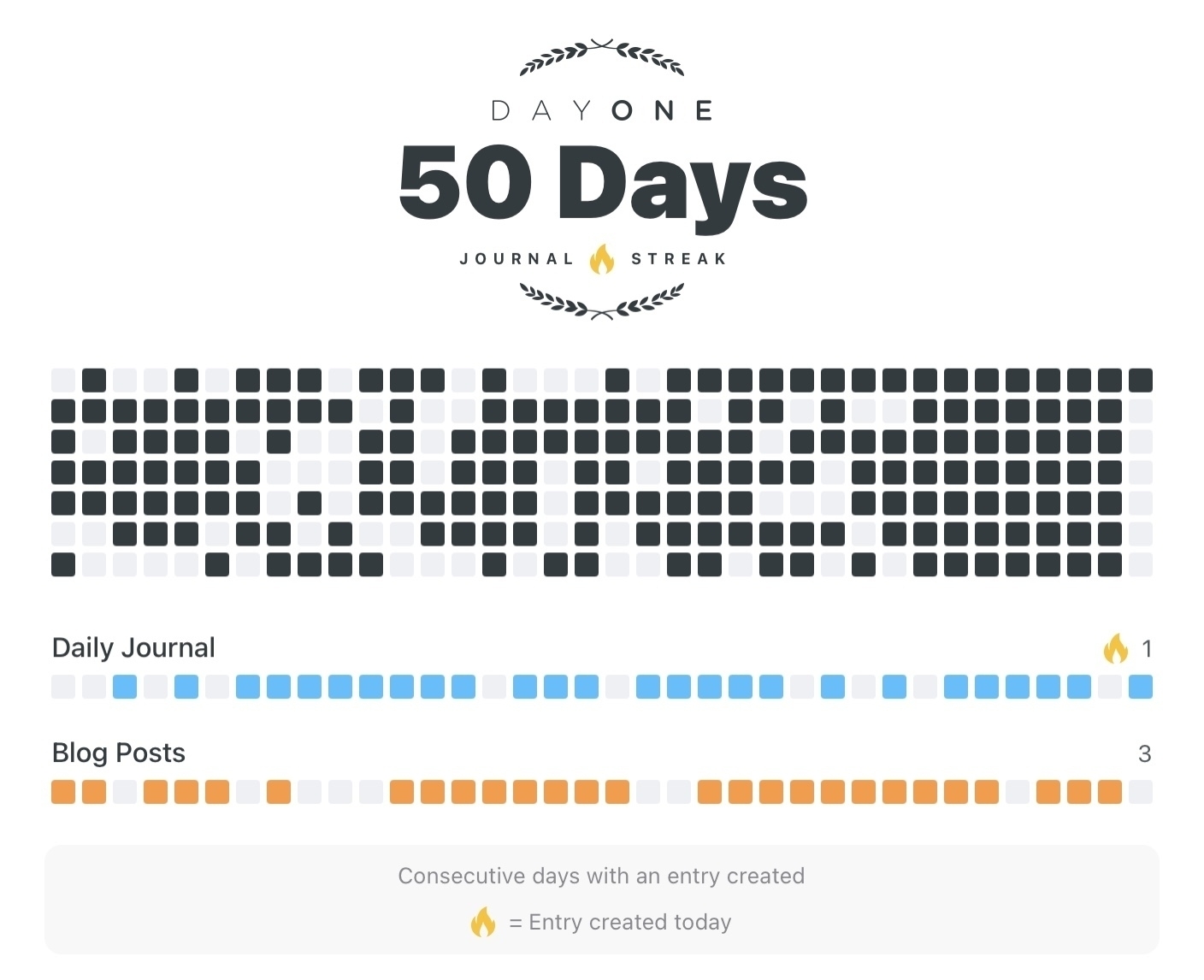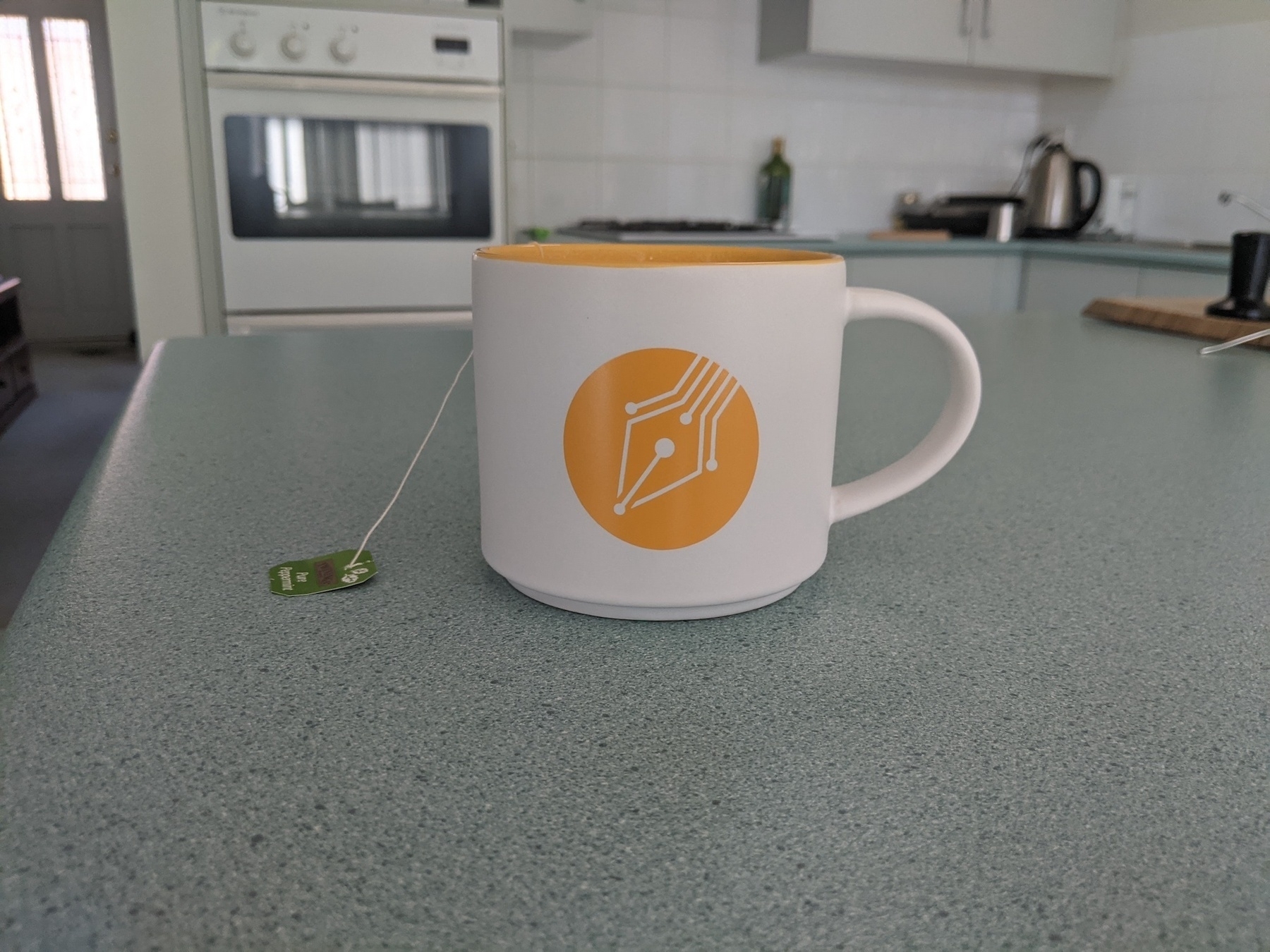-
Well, it took almost a full 4 months, but I’ve finally got a solar system installed on my house. It’s not functional yet — it needs to go through inspection — but hopefully in a few weeks it should be active and generating power.
-
I was perusing my archives the other day and I’ve noticed that it’s been two years to the day since my first ever blog post. Also of note was just how infrequently I was posting back then — only 7 posts in 9 months. I’m glad blogging has developed into more of a habit now.
-
The popups for the admin password in MacOS needs a third button with the label “I wish I had the admin password, and believe me when I say that if I did, I would enter it; but I don’t, so please stop asking me.”
-
On a bit of a writing streak: 50 consecutive days of at least one blog post or journal entry.

P.S. I wonder if writing an entry about this streak, just to keep the streak going, is a form of cheating.
-
More work on the project I mentioned yesterday, codenamed Broadtail. Most of the work was around the management of download jobs. I’m using a job management library I’ve built for another project and integrated it here so that the video downloads could be observable from the web frontend. The library works quite well, but at the moment, the jobs are not kept on any sort of disk storage. They are kept in memory until they’re manually cleared, but I’m hoping to only keep the active jobs in memory, and store historical jobs onto disk. So most of today’s session was spent on making that possible, along with some screens to list and view job details.
-
It’s good to see that Dave Winer is keeping a blog on Drummer change notes. I’m having some trouble publishing a post this morning, possibly due to timezones, and seeing a post acknowledging the problem makes me feel better. A good example of narrating one’s work.
-
Start of Yet Another Project Because I Can't Help Myself
One of the reasons why I stopped work on Lorikeet was that I was inspired by those on Micro.blog to setup a Plex server for my YouTube watching needs. A few years ago, I actually bought an old Intel Nuc for that reason, but I never got around to setting it up. I managed to do so last Wednesday and so far it’s working pretty well. The next thing I’d like to do is setup RSS subscriptions for certain YouTube channels and automatically download the videos when they are publish. Continue reading →
-
It’s that time of year when I need to wear sunscreen if I’m going to be outside for an extended period of time. I really dislike sunscreen, but sadly, I burn to a crisp if I don’t have any on.
-
I’ve rediscovered the joy of honey on toast. What a winning combination. Goes really well with the thickly sliced loaf of bread I had to buy (I usually go thin but there was none available).
-
Oh the irony. First weekend after Lockdown 6 and with plans for activities outdoors…

-
I only just realised that my Pixel 2 would be missing out of Android 12. I guess that means that I’ll be shopping for a new phone soon. The Pixel 6 looks interesting but given Google’s less-than-perfect track record with these phones, I should probably wait for some reviews first.
-
If anyone’s thinking of starting a company that extracts CO2 from the atmosphere, and you don’t mind it sounding a bit too Australian, here’s a free name for you to use:
Carbo Garbo
Enjoy.
-
I just finished reading through the Ars Technica live blog of the Apple event. I must say, their new chips look really good, especially the M1 Max. I can just imagine that being a beast when “unleashed” (sorry). I’m looking forward to them showing up in a desktop machine.
-
Abandoning Project Lorikeet
I’ll admit it: the mini-project that I have been working on may not have been a good idea. The project, which I gave the codename Lorikeet, was to provide a way to stream YouTube videos to a Chromecast without using the YouTube app. Using the YouTube app is becoming a real pain. Ads aside, they’ve completely replaced the Chromecast experience from a very basic viewing destination to something akin to a Google TV, complete with recommendations of “Breaking News” from news services that I have no interest in seeing. Continue reading →
-
I try to minimise the number of regrets I will eventually have in my life, but sometimes they do happen. One regret I do have is only taking up blogging/journaling relatively recently. I feel it would have been better if I started much earlier.
-
I don’t understand people who would ruin their own website with popups thrown in my face the minute I start reading which are impossible to dismiss. If this is the way you treat me when I read your content, what makes you think I’d be interested in doing business with you?
-
Two People
There are two people, and each one has the same problem that they want to get solved. The first person chooses the option to pay $10 a month, and all they have to do is sign up to a service that will solve the problem for them. The service they sign up for takes care of the rest. The second person chooses the option to pay $15 a month, 20 hours of work to get something built, and an ongoing commitment to keep it maintained. Continue reading →
-
I’ve never been someone that has their TV on all the time; but after working at home, by myself, on and off for the last 19 months, I can see why people do. Just having some background noise that you can sort of half listen to can help keep the mind somewhat calm.
-
My Stratechery mug has arrived.

It now holds the enviable position of largest mug in my house, holding roughly 1.5x as much liquid as the mugs I usually use.

-
The danger of playing around with blogging platforms is that you find yourself wondering which platform you should continue using. Do you split your writing across multiple platforms? If so, how? Such is the current feeling I have with Micro.blog and Drummer.
-
I heard that Dave Winer has released Drummer so I decided to give it a try. Although I’m not fully sold on using an outliner to blog, I do appreciate the way it allows for passive blogging: just that natural approach to writing what you’re thinking about. I am interested in trying out some of scripting aspects of it. I found Winer’s approach to building the scripting capabilities directly into the web-app to be fascinating.
-
Just arrived home from receiving my second dose of AstraZenica. Feeling pretty good about it. Not long now until full maxination. 💉💉
-
I’ve got a Shortcut on my iPad to save links to Pinboard. I want to get the page title when I save the bookmark, so I’ve added a Safari step which reads the title from the webpage itself. And by adding this step, every time I run the Shortcut, I get asked to grant permission to Safari to read the webpage in order to get the title. Every. Single. Time.
Apple: some advice. I’ve wrote this Shortcut myself. I’ve explicitly added a step to get something from the website myself. Therefore, I am explicitly granting Safari permission to access the website. If I didn’t want Safari to read the website content, I wouldn’t have put that step in the Shortcut at all.
Please, stop asking me for permission to do something I’ve asked you to do, and just do it!
-
Just finished a lovely game of Wingspan with the Oceania Expansion set. It was nice playing the game with birds that I recognise.
-
This is another post lamenting the fact that too many development blogs from companies like Netflix and Shopify use a CMS that don’t publish an RSS feed. It’s either Medium, or something geared towards email newsletters. Why? It’s not like they depend on reader subscriptions. 🤷